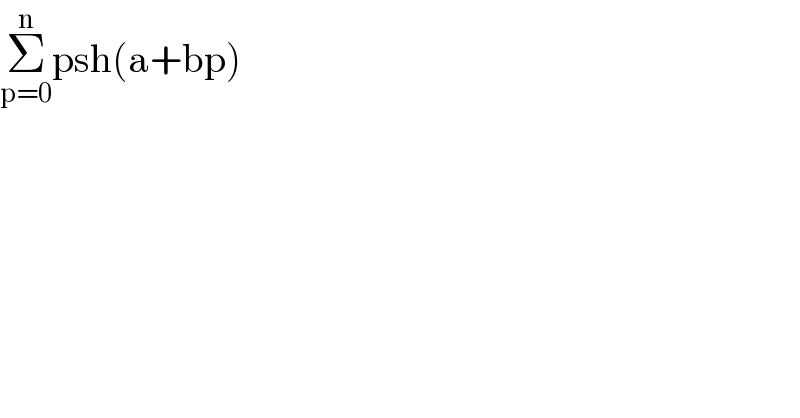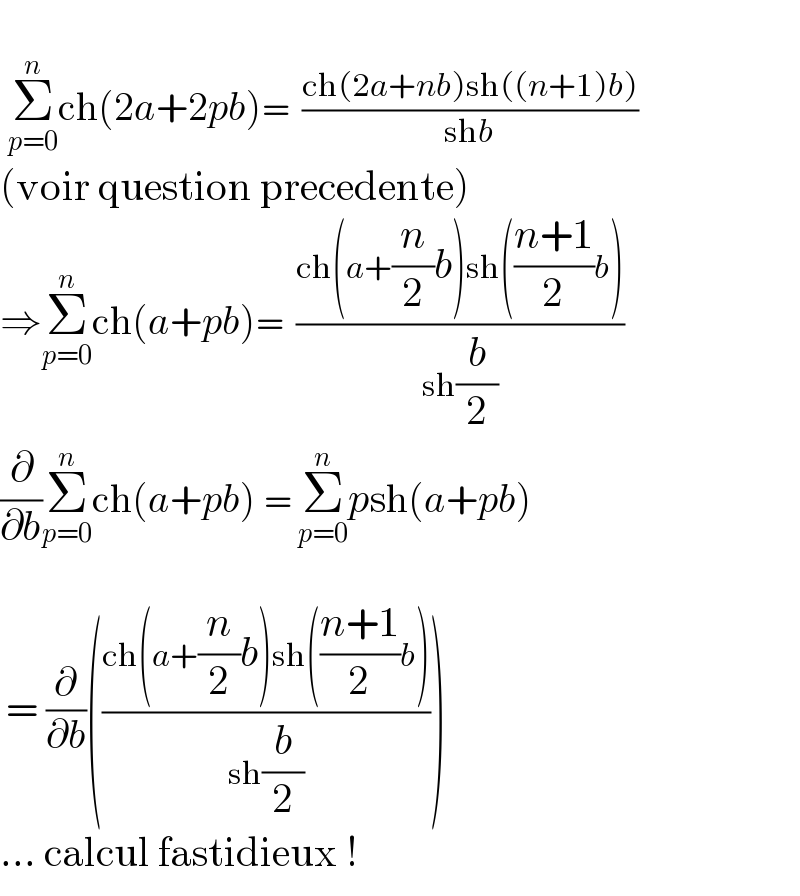Question Number 147828 by puissant last updated on 23/Jul/21

$$\underset{\mathrm{p}=\mathrm{0}} {\overset{\mathrm{n}} {\sum}}\mathrm{psh}\left(\mathrm{a}+\mathrm{bp}\right) \\ $$
Answered by Olaf_Thorendsen last updated on 23/Jul/21

$$ \\ $$$$\:\underset{{p}=\mathrm{0}} {\overset{{n}} {\sum}}\mathrm{ch}\left(\mathrm{2}{a}+\mathrm{2}{pb}\right)=\:\:\frac{\mathrm{ch}\left(\mathrm{2}{a}+{nb}\right)\mathrm{sh}\left(\left({n}+\mathrm{1}\right){b}\right)}{\mathrm{sh}{b}} \\ $$$$\left(\mathrm{voir}\:\mathrm{question}\:\mathrm{precedente}\right) \\ $$$$\Rightarrow\underset{{p}=\mathrm{0}} {\overset{{n}} {\sum}}\mathrm{ch}\left({a}+{pb}\right)=\:\:\frac{\mathrm{ch}\left({a}+\frac{{n}}{\mathrm{2}}{b}\right)\mathrm{sh}\left(\frac{{n}+\mathrm{1}}{\mathrm{2}}{b}\right)}{\mathrm{sh}\frac{{b}}{\mathrm{2}}} \\ $$$$\frac{\partial}{\partial{b}}\underset{{p}=\mathrm{0}} {\overset{{n}} {\sum}}\mathrm{ch}\left({a}+{pb}\right)\:=\:\underset{{p}=\mathrm{0}} {\overset{{n}} {\sum}}{p}\mathrm{sh}\left({a}+{pb}\right)\: \\ $$$$ \\ $$$$\:=\:\frac{\partial}{\partial{b}}\left(\frac{\mathrm{ch}\left({a}+\frac{{n}}{\mathrm{2}}{b}\right)\mathrm{sh}\left(\frac{{n}+\mathrm{1}}{\mathrm{2}}{b}\right)}{\mathrm{sh}\frac{{b}}{\mathrm{2}}}\right) \\ $$$$…\:\mathrm{calcul}\:\mathrm{fastidieux}\:! \\ $$
Commented by puissant last updated on 23/Jul/21

$$\mathrm{merci}\:\mathrm{prof}\:\mathrm{c}'\mathrm{est}\:\mathrm{trivial}… \\ $$
